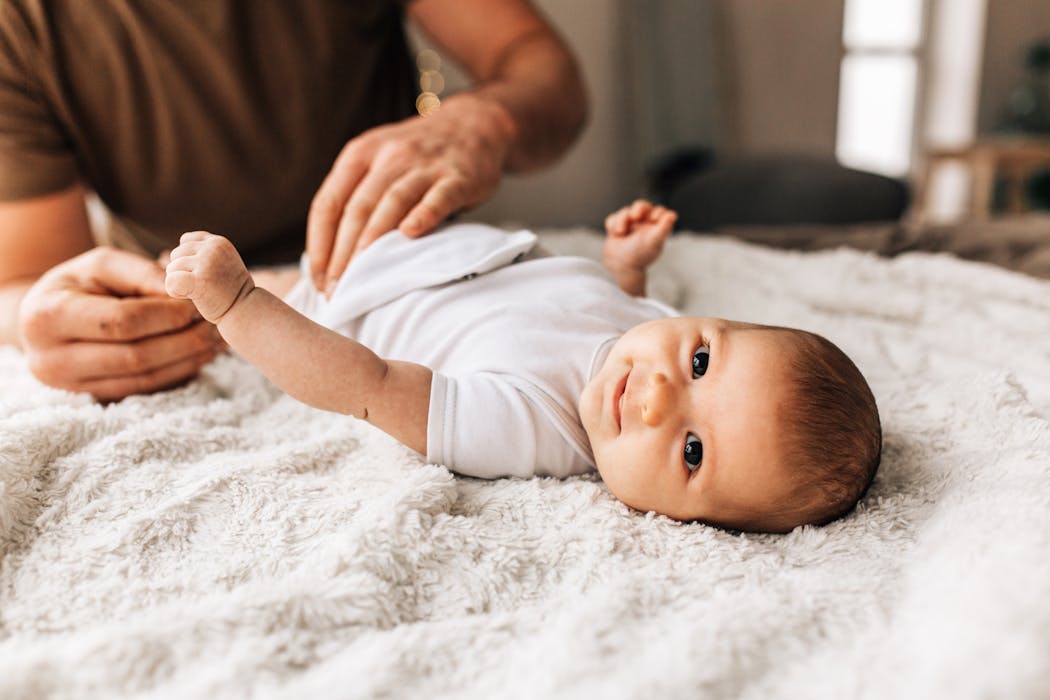
There has been a lot of focus on the need to teach older children about consent. But parents should not wait until kids are teenagers to talk about appropriate touching or how everyone has the right to say what happens to their body.
In fact, the earlier parents talk about this with their kids, the better.
This way, consent becomes a normal, everyday part of life. Importantly, it also helps to keep kids safe from abuse as they learn what is and isn’t OK when it comes to their bodies.
You can start teaching little ones about consent even before they can talk. Here’s how you can do this during everyday care.
Read more: 7 ways to teach little kids about body safety before they can talk
Try not to rush
Nappy changes can easily be seen by parents as a task to rush through and just “get done”.
But this can be a time to help children learn about consent and how their bodies work.
Toileting is something young children will take charge of in the future. What happens before learning how to use the toilet should not be a mystery.
Be clear about what’s going on
At the start of a nappy change, ensure your child knows what is happening. Get down to their level and say, “you need a nappy change” and then pause so they can take this in.
Then you can say, “do you want to walk/crawl with me to the change table, or would you like me to carry you?”
Observe their facial expressions and body language to check if they understand what is happening. Aim to be positive, gentle and responsive to your child.
Don’t distract your child
Children are often encouraged to be distracted in nappy changes, to focus their attention on something else. For example, a well-meaning parent signs a song to them or gives them a rattle to hold.
But it’s important children notice when someone is touching their most intimate parts.
Even in early infancy, children can respond to consistent verbal cues. So try to use similar language and follow regular nappy changing routines that involve children in conversation. For example, “can you please lift up your bottom so I can slide your nappy out?”
These habits plant the seed of the idea that a child has the right to say what happens to their body.
Be kind to yourself
Of course some nappy changes may need to be more rushed or in an odd place. Perhaps you are late for work or you need to pull over on the side of the road to deal with an urgent poosplosion.
The habits we outline above may also seem to add more work to the already demanding parental load. So try and do them as often as possible and be kind to yourself if every nappy change isn’t a perfect moment of connection, you are supporting a small child after all.
Use the proper terms
While you are doing this, use the correct anatomical terms – vulva, penis, anus. Parents may feel uncomfortable doing this and think more childish names should be used. But this keeps children safe as it means they can then inform trusted adults about their experiences with all the people who care for them.
Use these same principles when you are changing their clothes or giving them a bath.
Give kids simple choices
Away from the change table, look for ways to provide opportunities for children to have choice and a sense of agency and autonomy in everyday life situations. This helps nurture their independence and can reduce power struggles. Some examples of this could be,
do you want to wear your blue or your yellow shirt today?“
do you want apple or pear?
do you want to go to the park or for a walk around the block?
Recognise their body language
In previous pieces, experts have noted how you should not force your kids to hug other adults or relatives if they don’t want to.
But parents can also be aware of their own behaviour – how your child is reacting when you’re picking them up or giving them a hug.
Sometimes you may have no choice (for example, picking a child up before crossing a busy road). But where possible, use children’s body language and cues to take their views into account.
This article is republished from The Conversation, a nonprofit, independent news organization bringing you facts and trustworthy analysis to help you make sense of our complex world. It was written by: Katherine Bussey, Deakin University and Nicole Downes, Deakin University
Read more:
- How can you help your child prepare to start high school next year?
- A safety expert explains why you should stay in Australia for schoolies and avoid overseas
- Is your child’s school using generative AI? Here are 8 questions to ask
Katherine Bussey receives funding from Department of Education, Victorian Government for other research projects. She is affiliated with Infant and Toddler Advocacy Network Australia (ITANA), a not-for-profit organisation.
Nicole Downes has previously received funding from the Department of Education for other projects.


 The Conversation
The Conversation
 People Human Interest
People Human Interest Vogue
Vogue NBC Bay Area Dixon News
NBC Bay Area Dixon News Newsweek Top
Newsweek Top Breitbart News
Breitbart News Political Wire
Political Wire The List
The List Reuters US Politics
Reuters US Politics E Online
E Online